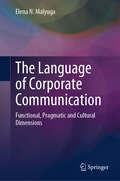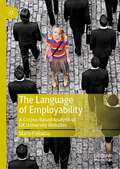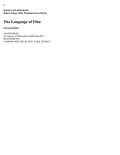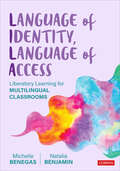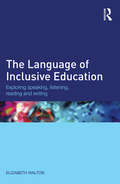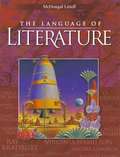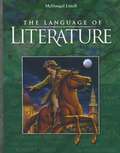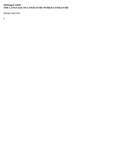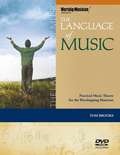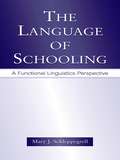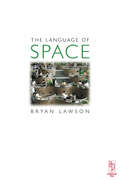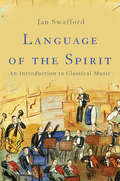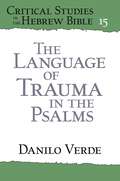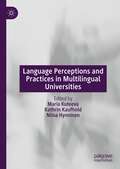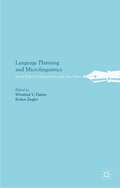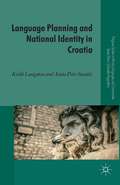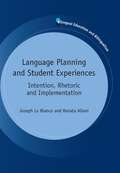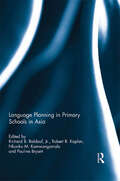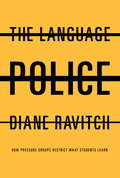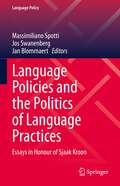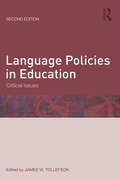- Table View
- List View
The Language of Corporate Communication: Functional, Pragmatic and Cultural Dimensions
by Elena N. MalyugaThis book explores diverse cultural and linguistic landscapes, unraveling the fusion of language, culture, and corporatism. It breaks new ground by examining lesser-known linguistic-cultural aspects of corporate communication. It provides deeper insights into conversational practices, cultural variations, and gender-specific speech aggression within the corporate realm. The book delves into functional aspects, such as corporate terminology and stylistic techniques, as well as the pragmatic dimension with humor and emotive language. Offering a unique perspective on corporate language, it deepens understanding of semantic dynamics and emphasizes language's power to meet diverse communication needs. The book is a must-read for corporate professionals, linguists, scholars, business leaders, communication consultants, and educators teaching the language of business and corporate communication. It is also an invaluable asset for anyone seeking to navigate the intricacies of corporate communication in today's globalized business landscape.
The Language of Employability: A Corpus-Based Analysis of UK University Websites
by Maria FotiadouThis book employs a corpus-based Critical Discourse Analysis (CDA) methodology to analyse the language used by university careers services in the UK. Drawing on a corpus which includes the public-facing websites of careers services from 24 Russell Group and 34 Post-92 universities, the author highlights some of the potentially problematic 'common-sense' views and ideas that are currently promoted to students using these services. She argues that the language used by university websites promotes neoliberal ideology and encourages the denaturalisation of such language. This book will be of interest to linguists, sociologists, education scholars, and scholars who are otherwise interested in the notion of employability.
The Language Of Film (Basics Film-making Ser.)
by Robert Edgar John Marland Steven RawleAn effective filmmaker needs to have a good understanding of how film language works, and more importantly, how to actively influence an audience's thoughts and feelings and guide their gaze around the screen. Packed with examples from classic and contemporary cinema, The Language of Film reveals the essential building blocks of film and explains how the screen communicates meaning to its audience. You will learn about fundamental theories and concepts, including film semiotics, narrative structures, ideology, and genre, as well as how elements such as shot size, camera movement, editing technique, and color come together to create the cinematic image. With insightful case studies and discussion questions, dozens of practical tips and exercises, and a new chapter on film sound, this new edition of The Language of Film is a must-have guide for aspiring filmmakers.
Language of Identity, Language of Access: Liberatory Learning for Multilingual Classrooms
by Michelle Benegas Natalia BenjaminGrow students’ linguistic capital AND value their home language In Language of Identity, Language of Access, authors Michelle Benegas and Natalia Benjamin highlight the urgent need for a revolution in language education that validates home languages and dialects while equipping students with the linguistic tools for social mobility. Their original LILA framework rejects the socially constructed hierarchy of languages and provides students with a broader linguistic repertoire. This accessible and teacher-friendly guide presents an overview of this liberatory approach to language and literacy, an exploration of linguistically sustaining and expanding instruction, and practical guidance on designing lessons that attend to the language of identity and the language of access. Additional recurring features include: Voces provide real-life teacher experiences from the classroom Reflecciónes encourage educators to consider how principles and ideas relate to current practice and promote translanguaging Practical applications of theories (PATs) provide conceptual frameworks and lesson plans on various topics and activities. End of Chapter Conversaciónes encourage dialogue and enable educators to implement concepts in their classrooms. Offering a fresh perspective on academic language as a means to access power and social capital, Language of Identity, Language of Access is a guide for ALL educators committed to linguistically sustaining pedagogies and empowering students with linguistic capital for social mobility.
Language of Identity, Language of Access: Liberatory Learning for Multilingual Classrooms
by Michelle Benegas Natalia BenjaminGrow students’ linguistic capital AND value their home language In Language of Identity, Language of Access, authors Michelle Benegas and Natalia Benjamin highlight the urgent need for a revolution in language education that validates home languages and dialects while equipping students with the linguistic tools for social mobility. Their original LILA framework rejects the socially constructed hierarchy of languages and provides students with a broader linguistic repertoire. This accessible and teacher-friendly guide presents an overview of this liberatory approach to language and literacy, an exploration of linguistically sustaining and expanding instruction, and practical guidance on designing lessons that attend to the language of identity and the language of access. Additional recurring features include: Voces provide real-life teacher experiences from the classroom Reflecciónes encourage educators to consider how principles and ideas relate to current practice and promote translanguaging Practical applications of theories (PATs) provide conceptual frameworks and lesson plans on various topics and activities. End of Chapter Conversaciónes encourage dialogue and enable educators to implement concepts in their classrooms. Offering a fresh perspective on academic language as a means to access power and social capital, Language of Identity, Language of Access is a guide for ALL educators committed to linguistically sustaining pedagogies and empowering students with linguistic capital for social mobility.
The Language of Inclusive Education: Exploring speaking, listening, reading and writing
by Elizabeth WaltonThe Language of Inclusive Education is an insightful text which considers the writing, speaking, reading and hearing of inclusive education. Based on the premise that humans use language to construct their worlds and their realities, this book is concerned with how language works to determine what we know and understand about issues related to in/exclusion in education. Using a variety of analytical tools, the author exposes language-at-work in academic and popular literature and in policy documents. Areas of focus include: What inclusive education means and how it is defined How metaphor works to position inclusive education How textbooks construct inclusive education How we use language to build what we understand to be difference and disability, with particular reference to AD(H)D and Asperger’s Syndrome Listening to children and young people as a means to promote inclusion in schools Woven through this volume is the argument for a more critical awareness of how we use language in the field that we call ‘inclusive education’. This book is a must-read for any individual studying, practicing or an interest in inclusion and exploring the associations with language.
The Language of Literature (Grade #9)
by Arthur N. Applebee Andrea B. Bermudez Sheridan Blau Rebekah Caplan Peter Elbow Susan Hynds Judith A. Langer James MarshallThe Language of Literature provides the readers with abundant pleasuring reading materials with a rich content such as The Power of Storytelling, Passages, Voices of Experience, All in the Family, A World of Mysteries, The Classic Tradition. An additional attractive feature of Student Resource Bank contains Glossary of Literary Terms, Writing Handbook, Communication Handbook and Grammar Handbook.
The Language of Literature (Grade #7)
by Arthur N. Applebee Andrea B. Bermúdez Sheridan Blau Rebekah Caplan Peter Elbow Susan Hynds Judith A. Langer James MarshallBecoming an Active Reader involves more than just enjoying the power of storytelling. To understand and appreciate the literature in this book, you'll need to learn and apply the reading strategies.
The Language of Literature (Grade #8)
by Andrea B. Bermúdez Sheridan Blau Rebekah Caplan Peter Elbow Susan Hynds Judith A. Langer James Marshall Arthur N. ApplebeeBecoming an Active Reader involves more than just enjoying the power of storytelling. To understand and appreciate the literature in this book, you'll need to learn and apply the reading strategies listed here. As you begin to learn the strategies and how to use them, stop from time to time to monitor how well they are working for you. If it helps your reading, modify the strategies as necessary to suit your needs.
The Language of Literature (Grade #10)
by Mcdougal LittellA great collection of literature from different authors ranging from the classic ones to the modern ones.
The Language of Literature: World Literature (Language of Literature)
by McDougal-Littell Publishing StaffA selection of literature; formal and integrated assessment in literary analysis, reading, and writing; and integrated technology, including audio, video, computer, and Internet resources, makes literature accessible to students of all learning styles.
The Language of Music: Practical Music Theory for the Worshipping Musician (Worship Musician Presents Series)
by Tom BrooksIn The Language of Music, Tom Brooks demystifies and explains the basic building blocks of music in a simple, clear, straightforward way – essential knowledge that every worship musician needs to perfect his craft. The book offers a practical, real-world approach to all the fundamental concepts; music theory and harmony, chord construction, scales, key signatures, chord relationships, transposition, modulation, chart reading, and basic arranging, along with tips on how to practice more efficiently and rehearse more effectively, and much more. The focus is on contemporary praise and worship; music that is inspiring the church in the 21st century.
The Language of Organizational Styling
by Lionel WeeThe ways in which commercial organizations and service providers 'style' themselves - creating the image they wish to portray to their potential consumers - is a long-established area of research in the fields of sociology and business studies. However language also plays an important role in organizational styling, something which until now has been largely overlooked in the literature. This is the first book-length study of the linguistics of organizational styling, looking at the language and semiotic resources used by holiday resorts, pharmaceutical companies, restaurants and insurance companies in order to project their identities, and style themselves. It discusses in detail a number of case studies and presents an innovative take on the notion of style, as well as bringing together work from linguistics, business studies and sociology. This interdisciplinary book will be of interest to scholars and advanced students in sociolinguistics, and scholars of sociology and business studies.
The Language of Schooling: A Functional Linguistics Perspective
by Mary J. SchleppegrellThis book is about how language is used in the context of schooling. It demonstrates that the variety of English expected at school differs from the interactional language that students use for social purposes outside of school, and provides a linguistic analysis of the challenges of the school curriculum, particularly for non-native speakers of English, speakers of non-standard dialects, and students who have little exposure to academic language outside of schools. The Language of Schooling: A Functional Linguistics Perspective builds on current sociolinguistic and discourse-analytic studies of language in school, but adds a new dimension--the framework of functional linguistic analysis. This framework focuses not just on the structure of words and sentences, but on how texts are constructed--how particular grammatical choices create meanings in the different kinds of texts students are asked to read and write at school. The Language of Schooling: A Functional Linguistics Perspective*provides a functional description of the kinds of texts students are expected to read and write at school;*relates research from other sociolinguistic and language development perspectives to research from the systemic functional linguistics perspective;*focuses on the increasing linguistic demands of contexts of advanced literacy (middle school through college);*analyzes the genres typically encountered at school, with extensive description of the grammatical features of the expository essay, a gatekeeping genre for secondary school graduates;*reviews the grammatical features of disciplinary genres in science and history; and*argues for more explicit attention to language in teaching all subjects, with a particular focus on what is needed for the development of critical literacy.This book will enable researchers and students of language in education to recognize how the grammatical and discourse features of the language of schooling construct the content areas, role relationships, and purposes and expectations of schools. It also will enable them to better understand the nature of language itself and how it emerges from and helps to maintain social structures and institutions, and to apply these understandings to creating classroom environments that build on the strengths students bring to school.
Language of Space
by Bryan LawsonThis unique guide provides a systematic overview of the idea of architectural space. Bryan Lawson provides an ideal introduction to the topic, breaking down the complex and abstract terms used by many design theoreticians when writing about architectural space. Instead, our everyday knowledge is reintroduced to the language of design. Design values of 'space' are challenged and informed to stimulate a new theoretical and practical approach to design.This book views architectural and urban spaces as psychological, social and partly cultural phenomena. They accommodate, separate, structure, facilitate, heighten and even celebrate human spatial behaviour.
Language of the Spirit: An Introduction to Classical Music
by Jan SwaffordFor many of us, classical music is something serious-something we study in school, something played by cultivated musicians at fancy gatherings. In Language of the Spirit, renowned music scholar Jan Swafford argues that we have it all wrong: classical music has something for everyone and is accessible to all. Ranging from Gregorian chant to Handel's Messiah, from Vivaldi's The Four Seasons to the postmodern work of Philip Glass, Swafford is an affable and expert guide to the genre. He traces the history of Western music, introduces readers to the most important composers and compositions, and explains the underlying structure and logic of their music.Language of the Spirit is essential reading for anyone who has ever wished to know more about this sublime art.
The Language of Trauma in the Psalms (Critical Studies in the Hebrew Bible)
by Danilo VerdeOver the last few decades, the field of trauma studies has shed new light on biblical texts that deal with individual and collective catastrophe. In The Language of Trauma in the Psalms, Danilo Verde advances the conversation, moving beyond the emphasis on healing that prevails in most literary trauma studies. Using the lens of cognitive linguistics and combining insights from trauma studies and redaction criticism, Verde explores how trauma is expressed linguistically in the book of Psalms, how trauma-related language was rooted in ancient Israel’s external realities, and how psalms helped define Yehud’s cultural trauma in the Persian period (539–331 BCE). Rather than assuming the psalmists’ personal experiences are reflected in these texts, Verde focuses on the linguistic strategies used to express trauma in the Psalms, especially references to the body and highly dramatic metaphors. Current analyses often approach trauma texts as tools intended to help sufferers heal. Verde contends that many group laments in the book of Psalms were transmitted not only to heal but also to wound the community, ensuring that the pain of a previous generation was not forgotten.The Language of Trauma in the Psalms shifts our understanding of trauma in biblical texts and will appeal to literary trauma scholars as well as those interested in ancient Israel.
Language Perceptions and Practices in Multilingual Universities
by Maria Kuteeva Kathrin Kaufhold Niina HynninenThis edited book examines language perceptions and practices in multilingual university contexts in the aftermath of recent theoretical developments questioning the conceptualization of language as a static entity, drawing on case studies from different Northern European contexts in order to explore the effects of phenomena including internationalization, widening participation, and migration patterns on language attitudes and ideologies. The book provides cutting-edge perspectives on language uses in Northern European universities by drawing attention to the multiplicity of language practices alongside the prominence of English in international study programmes and research publication. It will be of interest to students and scholars of multilingualism, sociolinguistics, applied linguistics, and education, as well as language policymakers.
Language Planning and Microlinguistics
by Winifred V. Davies Evelyn ZieglerWhilst earlier studies of language planning and of standardisation have tended to study macro processes such as top-down language revitalisation campaigns or language polices at government level, this volume is in line with more recent work aimed at bridging the macro and the micro levels by examining how the two interact and influence each other. The aim of the volume as a whole is to contribute to a better understanding of the motivations underlying language users' decisions to adopt or resist language norms and policies of various kinds in their daily life. The individual chapters cover seven countries - the Czech Republic, Denmark, France, Germany, Japan, Luxembourg and Switzerland - and deal with different sociolinguistic constellations, ranging from communities dealing with variation within one language to those looking for ways to manage a multilingual repertoire.
Language Planning and National Identity in Croatia (Palgrave Studies in Minority Languages and Communities)
by K. Langston A. Peti-StanticFollowing the collapse of the former Yugoslavia, Croatian was declared to be a separate language, distinct from Serbian, and linguistic issues became highly politicized. This book examines the changing status and norms of the Croatian language and its relationship to Croatian national identity, focusing on the period after Croatian independence.
Language Planning and Student Experiences
by Joseph Lo Bianco Renata AlianiThis book is a timely comparison of the divergent worlds of policy implementation and policy ambition, the messy, often contradictory here-and-now reality of languages in schools and the sharp-edged, shiny, future-oriented representation of languages in policy. Two deep rooted tendencies in Australian political and social life, multiculturalism and Asian regionalism, are represented as key phases in the country's experimentation with language education planning. Presenting data from a five year ethnographic study combined with a 40 year span of policy analysis, this volume is a rare book length treatment of the chasm between imagined policy and its experienced delivery, and will provide insights that policymakers around the world can draw on.
Language Planning in Primary Schools in Asia
by Richard B. Baldauf Robert B. Kaplan Nkonko M. Kamwangamalu Pauline BryantIn foreign language education, decisions must be taken on what languages to teach, who will teach them, in which schools (i.e. all, only urban, only rural), in which grades, the number of hours a week, and the cost involved. This book explores the answers to these questions across a number of Asian polities. It illustrates why some of the efforts undertaken are successful and why some are not, why – despite significant investments of time and resources – some students do not seem to acquire the languages being taught, and why some teachers responsible for instruction in the designated foreign languages have problems achieving fluency in the designated language or have other language teaching difficulties. It suggests some strategies various polities might attempt to achieve their stated language learning objectives.This book was originally published as a special issue of Current Issues in Language Planning.
The Language Police
by Diane RavitchIf you're an actress or a coed just trying to do a man-size job, a yes-man who turns a deaf ear to some sob sister, an heiress aboard her yacht, or a bookworm enjoying a boy's night out, Diane Ravitch's internationally acclaimed The Language Police has bad news for you: Erase those words from your vocabulary!Textbook publishers and state education agencies have sought to root out racist, sexist, and elitist language in classroom and library materials. But according to Diane Ravitch, a leading historian of education, what began with the best of intentions has veered toward bizarre extremes. At a time when we celebrate and encourage diversity, young readers are fed bowdlerized texts, devoid of the references that give these works their meaning and vitality. With forceful arguments and sensible solutions for rescuing American education from the pressure groups that have made classrooms bland and uninspiring, The Language Police offers a powerful corrective to a cultural scandal.From the Trade Paperback edition.
Language Policies and the Politics of Language Practices: Essays in Honour of Sjaak Kroon (Language Policy #28)
by Massimiliano Spotti Jos Swanenberg Jan BlommaertThis edited volume consists of chapters celebrating the career of scholar Sjaak Kroon, who has produced ground-breaking work in the field of ethnography of education, immigrant minority language teaching and language politics. The chapters cover the use of immigrant minority languages in education and the development of policies at all levels and across the globe in this sometimes over-policed field. It particularly focuses on language policy analysis in which both the top-down institutional and the bottom-up ethnographic dimensions are blended, and in which globalization is the main macro-perspective. The chapters describe sensitive tools for investigating, unravelling and understanding the grey space connecting formal language policies to informal politics and practices of language on the ground.
Language Policies in Education: Critical Issues
by James W. TollefsonHow do language policies in schools create inequalities among learners? How do policies marginalize some students while granting privilege to others? How do language policies in education serve the interests of dominant groups within societies? How can linguistic minorities further their interests through attempts to change language policies in schools? This new edition of Language Policies in Education takes a fresh look at these enduring questions at the heart of fundamental debates about the role of schools in society, the links between education and employment, and conflicts between linguistic minorities and "mainstream" populations. Reflecting developments in language policy since the publication of the first edition in 2002, all chapters are original and substantial contributions to the study of language policy and exemplify major theories and research methods in the field. Chapter authors are major scholars in language policy and critical language studies. The case studies, international in scope, present cutting-edge analyses of important language policy debates in countries around the world.
